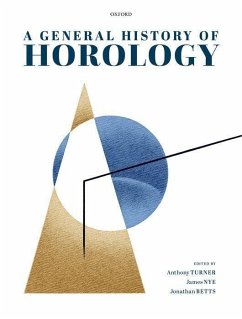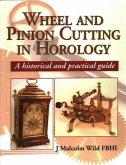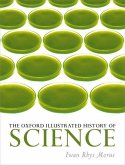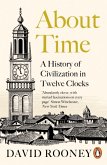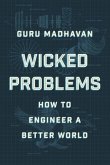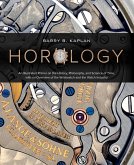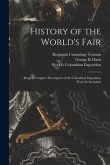A General History of Horology
Herausgeber: Turner, Anthony; Betts, Jonathan; Nye, James
Versandkostenfrei innerhalb Deutschlands
255,99 €
inkl. MwSt.
Versandkostenfrei*
Liefertermin unbestimmt
Melden Sie sich
hier
hier
für den Produktalarm an, um über die Verfügbarkeit des Produkts informiert zu werden.

128 °P sammeln
A General History of Horology
Herausgeber: Turner, Anthony; Betts, Jonathan; Nye, James
- Gebundenes Buch
The text provides a general history of horology, covering time-keeping worldwide and at all periods throughout history, from antiquity (Assyria and Egypt included) to the present day.
Andere Kunden interessierten sich auch für
![Wheel & Pinion Cutting in Horology Wheel & Pinion Cutting in Horology]() Malcolm WildWheel & Pinion Cutting in Horology44,99 €
Malcolm WildWheel & Pinion Cutting in Horology44,99 €![The Oxford Illustrated History of Science The Oxford Illustrated History of Science]() The Oxford Illustrated History of Science39,99 €
The Oxford Illustrated History of Science39,99 €![About Time About Time]() David RooneyAbout Time10,99 €
David RooneyAbout Time10,99 €![Wicked Problems Wicked Problems]() Guru Madhavan (National Academy of Engineering)Wicked Problems25,99 €
Guru Madhavan (National Academy of Engineering)Wicked Problems25,99 €![Horology Horology]() Barry B. KaplanHorology31,99 €
Barry B. KaplanHorology31,99 €![Discovering Engineering That Changed the World Discovering Engineering That Changed the World]() Julian EdgarDiscovering Engineering That Changed the World28,99 €
Julian EdgarDiscovering Engineering That Changed the World28,99 €![History of the World's Fair: Being a Complete Description of the Columbian Exposition From Its Inception History of the World's Fair: Being a Complete Description of the Columbian Exposition From Its Inception]() Benjamin Cummings 1835-1916 TrumanHistory of the World's Fair: Being a Complete Description of the Columbian Exposition From Its Inception34,99 €
Benjamin Cummings 1835-1916 TrumanHistory of the World's Fair: Being a Complete Description of the Columbian Exposition From Its Inception34,99 €-
-
-
The text provides a general history of horology, covering time-keeping worldwide and at all periods throughout history, from antiquity (Assyria and Egypt included) to the present day.
Hinweis: Dieser Artikel kann nur an eine deutsche Lieferadresse ausgeliefert werden.
Hinweis: Dieser Artikel kann nur an eine deutsche Lieferadresse ausgeliefert werden.
Produktdetails
- Produktdetails
- Verlag: Oxford University Press
- Seitenzahl: 776
- Erscheinungstermin: 28. September 2022
- Englisch
- Abmessung: 329mm x 261mm x 45mm
- Gewicht: 3032g
- ISBN-13: 9780198863915
- ISBN-10: 0198863918
- Artikelnr.: 62535989
- Herstellerkennzeichnung
- Libri GmbH
- Europaallee 1
- 36244 Bad Hersfeld
- gpsr@libri.de
- Verlag: Oxford University Press
- Seitenzahl: 776
- Erscheinungstermin: 28. September 2022
- Englisch
- Abmessung: 329mm x 261mm x 45mm
- Gewicht: 3032g
- ISBN-13: 9780198863915
- ISBN-10: 0198863918
- Artikelnr.: 62535989
- Herstellerkennzeichnung
- Libri GmbH
- Europaallee 1
- 36244 Bad Hersfeld
- gpsr@libri.de
Anthony Turner works primarily on the history of scientific instruments, clocks, watches and related items in their technical and social contexts during the Early Modern period. As consultant he collaborates with leading museums and auction houses and has been responsible for the organisation of several international exhibitions. James Nye studied Theology at Oxford, and later completed a PhD in Financial History at Kings College London. His thesis included case studies of early electric clock companies, reflecting a lifelong involvement in horology, especially in the electrical arena. From practical bench work on clocks as a teenager, his career progressed to researching and writing on the history of time measurement. A continuing theme in his ongoing work is the emergence of distributed accurate timekeeping from the late nineteenth century onwards. James is chair of the Antiquarian Horology Society, and founder and principal sponsor of London's Clockworks Museum. Jonathan Betts, a professional horologist all his life, was Senior Conservator and then Senior Curator of Horology at Royal Museums Greenwich for 35 years, and remains a Curator Emeritus. He is also Horological Adviser to a number of heritage bodies including the National Trust. He is Vice Chair and Honorary Librarian of the Antiquarian Horological Society.
* Introduction
* Horology: The word
* Hour Systems
* 1: Jérôme Bonnin: Time measurement in Antiquity
* 2: India and the Far East: dials, water-clocks, fire-clocks
* India
* China to 1900
* Modern China
* Japan
* 3: Late Antiquity and the Middle Ages
* Sun-dials and water-clocks in Byzantium and Islam
* Time-reckoning in the Medieval Latin world
* Water-clocks and the earliest escapements
* Sand-clocks, sand-glasses, and fire-clocks
* 4: Marisa Addomine: Public clocks: fourteenth to eighteenth centuries
* 5: The domestic clock in Europe
* From the fifteenth century to the mid-seventeenth century
* From Huygens to the end of the eighteenth century.
* 6: David Thompson: Watches in Europe 1600 - 1800
* 7: Anthony Turner: The Structures of horological manufacture and
trade: sixteenth to eighteenth centuries
* 8: Denis Savoie: The development of the sundial fourteenth to
twentieth centuries
* 9: Clocks as astronomical models
* Planetary clocks to the end of the eighteenth century
* The nineteenth and twentieth centuries.
* 10: Sharon Kerman: Musical and automaton clocks and watches: sound
and motion in time-telling devices
* 11: Jonathan Betts: The quest for precision in astronomy and
navigation
* 12: Anthony Turner: Decimal Time
* 13: Industrial manufacture: clock and watch-making in the nineteenth
and twentieth centuries
* The mixed fortunes of Britain
* American horology and its global reach
* The horological endeavour in France
* The challenge of the Swiss and their competitors
* Developing the German industry
* A case-study in standardisation: la pendule de Paris
* 14: Jonathan Betts: Precision attained: chronometers and regulators
in the nineteenth and twentieth centuries
* 15: Catherine Cardinal: Responding to customer demand: the decoration
of clocks and watches from the Renaissance to recent times
* 16: Roger Smith: Eighteenth-century clock exports from Britain to the
East Indies
* 17: Marisa Addomine: Public clocks in the nineteenth and twentieth
centuries
* 18: David Boettcher: Wrist-watches from their origins to the
twenty-first century
* 19: James Nye, David Rooney: Electricity, horology, and networked
time
* 20: Joëlle Mauerhan: Women in horology
* 21: Jonathan Betts: The keeping of clocks and watches: maintenance,
repair and restoration
* 22: Estelle Fallet: Accessories in horology
* 23: Applications of clockwork
* Orreries and planetaria
* Timers and telescope drives
* Metronomes
* Car clocks
* Watchmans' clocks
* Roasting jacks
* 24: Christina Faraday: Horology verbalised; horology visualised
* 25: Bernhard Huber: The Literature of horology
* 26: Anthony Turner: Collecting and writing the history of horology
* 27: Glossary
* 28: Bibliography
* Index
* Horology: The word
* Hour Systems
* 1: Jérôme Bonnin: Time measurement in Antiquity
* 2: India and the Far East: dials, water-clocks, fire-clocks
* India
* China to 1900
* Modern China
* Japan
* 3: Late Antiquity and the Middle Ages
* Sun-dials and water-clocks in Byzantium and Islam
* Time-reckoning in the Medieval Latin world
* Water-clocks and the earliest escapements
* Sand-clocks, sand-glasses, and fire-clocks
* 4: Marisa Addomine: Public clocks: fourteenth to eighteenth centuries
* 5: The domestic clock in Europe
* From the fifteenth century to the mid-seventeenth century
* From Huygens to the end of the eighteenth century.
* 6: David Thompson: Watches in Europe 1600 - 1800
* 7: Anthony Turner: The Structures of horological manufacture and
trade: sixteenth to eighteenth centuries
* 8: Denis Savoie: The development of the sundial fourteenth to
twentieth centuries
* 9: Clocks as astronomical models
* Planetary clocks to the end of the eighteenth century
* The nineteenth and twentieth centuries.
* 10: Sharon Kerman: Musical and automaton clocks and watches: sound
and motion in time-telling devices
* 11: Jonathan Betts: The quest for precision in astronomy and
navigation
* 12: Anthony Turner: Decimal Time
* 13: Industrial manufacture: clock and watch-making in the nineteenth
and twentieth centuries
* The mixed fortunes of Britain
* American horology and its global reach
* The horological endeavour in France
* The challenge of the Swiss and their competitors
* Developing the German industry
* A case-study in standardisation: la pendule de Paris
* 14: Jonathan Betts: Precision attained: chronometers and regulators
in the nineteenth and twentieth centuries
* 15: Catherine Cardinal: Responding to customer demand: the decoration
of clocks and watches from the Renaissance to recent times
* 16: Roger Smith: Eighteenth-century clock exports from Britain to the
East Indies
* 17: Marisa Addomine: Public clocks in the nineteenth and twentieth
centuries
* 18: David Boettcher: Wrist-watches from their origins to the
twenty-first century
* 19: James Nye, David Rooney: Electricity, horology, and networked
time
* 20: Joëlle Mauerhan: Women in horology
* 21: Jonathan Betts: The keeping of clocks and watches: maintenance,
repair and restoration
* 22: Estelle Fallet: Accessories in horology
* 23: Applications of clockwork
* Orreries and planetaria
* Timers and telescope drives
* Metronomes
* Car clocks
* Watchmans' clocks
* Roasting jacks
* 24: Christina Faraday: Horology verbalised; horology visualised
* 25: Bernhard Huber: The Literature of horology
* 26: Anthony Turner: Collecting and writing the history of horology
* 27: Glossary
* 28: Bibliography
* Index
* Introduction
* Horology: The word
* Hour Systems
* 1: Jérôme Bonnin: Time measurement in Antiquity
* 2: India and the Far East: dials, water-clocks, fire-clocks
* India
* China to 1900
* Modern China
* Japan
* 3: Late Antiquity and the Middle Ages
* Sun-dials and water-clocks in Byzantium and Islam
* Time-reckoning in the Medieval Latin world
* Water-clocks and the earliest escapements
* Sand-clocks, sand-glasses, and fire-clocks
* 4: Marisa Addomine: Public clocks: fourteenth to eighteenth centuries
* 5: The domestic clock in Europe
* From the fifteenth century to the mid-seventeenth century
* From Huygens to the end of the eighteenth century.
* 6: David Thompson: Watches in Europe 1600 - 1800
* 7: Anthony Turner: The Structures of horological manufacture and
trade: sixteenth to eighteenth centuries
* 8: Denis Savoie: The development of the sundial fourteenth to
twentieth centuries
* 9: Clocks as astronomical models
* Planetary clocks to the end of the eighteenth century
* The nineteenth and twentieth centuries.
* 10: Sharon Kerman: Musical and automaton clocks and watches: sound
and motion in time-telling devices
* 11: Jonathan Betts: The quest for precision in astronomy and
navigation
* 12: Anthony Turner: Decimal Time
* 13: Industrial manufacture: clock and watch-making in the nineteenth
and twentieth centuries
* The mixed fortunes of Britain
* American horology and its global reach
* The horological endeavour in France
* The challenge of the Swiss and their competitors
* Developing the German industry
* A case-study in standardisation: la pendule de Paris
* 14: Jonathan Betts: Precision attained: chronometers and regulators
in the nineteenth and twentieth centuries
* 15: Catherine Cardinal: Responding to customer demand: the decoration
of clocks and watches from the Renaissance to recent times
* 16: Roger Smith: Eighteenth-century clock exports from Britain to the
East Indies
* 17: Marisa Addomine: Public clocks in the nineteenth and twentieth
centuries
* 18: David Boettcher: Wrist-watches from their origins to the
twenty-first century
* 19: James Nye, David Rooney: Electricity, horology, and networked
time
* 20: Joëlle Mauerhan: Women in horology
* 21: Jonathan Betts: The keeping of clocks and watches: maintenance,
repair and restoration
* 22: Estelle Fallet: Accessories in horology
* 23: Applications of clockwork
* Orreries and planetaria
* Timers and telescope drives
* Metronomes
* Car clocks
* Watchmans' clocks
* Roasting jacks
* 24: Christina Faraday: Horology verbalised; horology visualised
* 25: Bernhard Huber: The Literature of horology
* 26: Anthony Turner: Collecting and writing the history of horology
* 27: Glossary
* 28: Bibliography
* Index
* Horology: The word
* Hour Systems
* 1: Jérôme Bonnin: Time measurement in Antiquity
* 2: India and the Far East: dials, water-clocks, fire-clocks
* India
* China to 1900
* Modern China
* Japan
* 3: Late Antiquity and the Middle Ages
* Sun-dials and water-clocks in Byzantium and Islam
* Time-reckoning in the Medieval Latin world
* Water-clocks and the earliest escapements
* Sand-clocks, sand-glasses, and fire-clocks
* 4: Marisa Addomine: Public clocks: fourteenth to eighteenth centuries
* 5: The domestic clock in Europe
* From the fifteenth century to the mid-seventeenth century
* From Huygens to the end of the eighteenth century.
* 6: David Thompson: Watches in Europe 1600 - 1800
* 7: Anthony Turner: The Structures of horological manufacture and
trade: sixteenth to eighteenth centuries
* 8: Denis Savoie: The development of the sundial fourteenth to
twentieth centuries
* 9: Clocks as astronomical models
* Planetary clocks to the end of the eighteenth century
* The nineteenth and twentieth centuries.
* 10: Sharon Kerman: Musical and automaton clocks and watches: sound
and motion in time-telling devices
* 11: Jonathan Betts: The quest for precision in astronomy and
navigation
* 12: Anthony Turner: Decimal Time
* 13: Industrial manufacture: clock and watch-making in the nineteenth
and twentieth centuries
* The mixed fortunes of Britain
* American horology and its global reach
* The horological endeavour in France
* The challenge of the Swiss and their competitors
* Developing the German industry
* A case-study in standardisation: la pendule de Paris
* 14: Jonathan Betts: Precision attained: chronometers and regulators
in the nineteenth and twentieth centuries
* 15: Catherine Cardinal: Responding to customer demand: the decoration
of clocks and watches from the Renaissance to recent times
* 16: Roger Smith: Eighteenth-century clock exports from Britain to the
East Indies
* 17: Marisa Addomine: Public clocks in the nineteenth and twentieth
centuries
* 18: David Boettcher: Wrist-watches from their origins to the
twenty-first century
* 19: James Nye, David Rooney: Electricity, horology, and networked
time
* 20: Joëlle Mauerhan: Women in horology
* 21: Jonathan Betts: The keeping of clocks and watches: maintenance,
repair and restoration
* 22: Estelle Fallet: Accessories in horology
* 23: Applications of clockwork
* Orreries and planetaria
* Timers and telescope drives
* Metronomes
* Car clocks
* Watchmans' clocks
* Roasting jacks
* 24: Christina Faraday: Horology verbalised; horology visualised
* 25: Bernhard Huber: The Literature of horology
* 26: Anthony Turner: Collecting and writing the history of horology
* 27: Glossary
* 28: Bibliography
* Index
